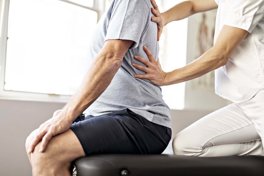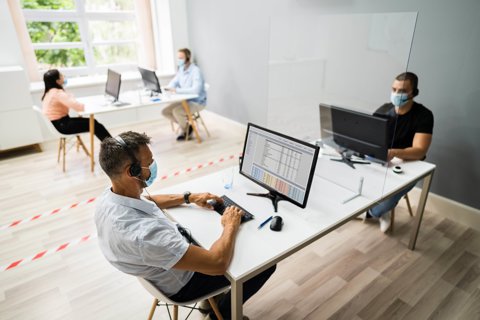Reportable Injuries
It is important to recognise that not all accidents that occur in the workplace are reportable under the RIDDOR. Those accidents which have occurred in the workplace which are both related to work and fall under a list of ‘reportable injuries’ will be required to be reported to the Health and Safety Executive under RIDDOR. Those specific injuries include:
- Fractures (apart from those that have occurred to the fingers, thumbs and toes)
- Amputations
- Any injury likely to lead to a permanent loss of sight
- Any injury likely to lead to a permanent reduction in sight
- Any crush injury to the head which causes damage to the brain
- Any crush injury to the torso which causes damage to internal organs
- Serious burns (including scalding injuries) which cover more than 10% of the body
- Serious burns (including scalding injuries) which cause significant damage to the eyes
- Serious burns (including scalding injuries) which cause significant damage to the respiratory system
- Serious burns (including scalding injuries) which cause significant damage to any vital organs
- Any scalping injury which requires hospital treatment
- Any loss of consciousness caused by a head injury
- Any loss of consciousness caused by asphyxia
- Any injury arising from a workplace in an enclosed space which leads to hypothermia
- Any injury arising from a workplace in an enclosed space which leads to heat induced illness
- Any injury arising from a workplace in an enclosed space which requires resuscitation
- Any injury arising from a workplace in an enclosed space which required admittance to hospital for more than 24 hours
In addition to the list of reportable injuries which has been covered above, any accident must be reported to the Health and Safety Executive under RIDDOR where they have resulted in an employee or a self employed person being away from work or being unable to perform their normal work duties for more than 7 consecutive days as a direct result of their injury. This 7 day period does not include the day of the accident but does include both weekends and rest days where the individual would not ordinarily be working.
Any report under RIDDOR made to the Health and Safety Executive must be made within 15 days of the accident occurring. There is also consideration which must be given to those accidents which result in a worker being incapacitated for more than 3 days. These types of accident do not need to be reported as such, but they do have to be recorded in an accident book. All employers must keep accident books.
IPPR Research
Despite the current statistics on workplace injuries within the UK, it has been reported that the UK is one of the safest places in the world to work. However, that doesn’t mean that more can’t be done to prevent avoidable workplace injuries.
This is certainly the view of the Institute of Public Policy Research (IPPR), which suggests measures to improve workplace safety which includes:
- New protections for whistleblowers
- More funding for the Health and Safety Executive (HSE)
- Making sure UK laws continue to meet the standards of the European Union
- A greater role in society for Trade Unions
The IPPR report has been backed by the Association of Personal Injury Lawyers (APIL). This organisation includes some of our Personal Injury Lawyers among its members who feel strongly about this issue. The report conducted by the IPPR was published ahead of Injury Prevention Week which took place between 26 June 2023 and 30 June 2023 this year.
This is a national campaign which is calling for the law to be reformed so that it works better for injured people, while acknowledging that, of course, the ultimate goal is to stop people being needlessly injured completely.
What Can Be Done to Prevent Injuries and Accidents in the Workplace?
A Whistleblower Guarantee
The IPPR says that more must be done to give people the confidence to speak out against their employer if they aren’t taking health and safety seriously. This could include:
- Giving whistleblowers access to Legal Aid if they want to fight an unfair dismissal
- Providing emergency financial support if a person leaves their job because of whistleblowing
- Giving whistleblowers access to the best workplace counselling
- More Scrutiny of Future Health and Safety Law Changes
Many health and safety laws in the UK may diverge from those in the European Union (EU) following the impact of Brexit, so the IPPR wants any departures from EU law to be independently monitored, perhaps by a body such as the House of Lords. This, it said, would lead to an informed discussion about worker protections after Brexit and would put the Government under pressure to stop UK standards falling behind those in the European Union.
Trade Unions to be Promoted and Empowered
The IPPR believes there’s “overwhelming evidence” that workplace unions have a positive effect on preventing injury and ill health and says they’ve played a big role in enabling workers to return to work safely during the Coronavirus pandemic.
Due to this, the IPPR believes that employers should be actively encouraged to engage with Trade Unions as a “constructive partner” and that the Government should both “promote and empower” unions.
Despite this, only 22.3% of the population in 2022 throughout the UK were a member of a trade union which shows a fairly substantial decline from 32.4% in 1995.
More Funding for the HSE
The IPPR says that businesses often see the Health and Safety Executive (HSE) just as an enforcer of health and safety regulations, rather than a source of advice and guidance. But the report states that if the HSE got more funding, it could reopen services such as advisory hotlines, which may help improve its relationship with employers.
Businesses Should Publish COVID Risk Assessments
Companies aren’t currently obliged to publish COVID risk assessments, but the IPPR thinks making them mandatory for firms that employ 50 or more people would encourage them to take the process more seriously.
More Support to Help Small Businesses Become COVID-Secure
The IPPR has proposed a grant scheme run by local councils to help small businesses make their premises COVID-secure, as many can’t afford the upfront cost of responding to the guidance.
Increase Statutory Sick Pay So Employees Can Self-Isolate
Many people who should be self-isolating are still going to work and potentially putting their colleagues at risk because of financial worries. The IPPR has suggested increasing statutory sick pay, so people don’t have to choose between financial hardship and doing their bit to contain the spread of coronavirus.
Mike Benner, Chief Executive of the Association of Personal Injury Lawyers, believes this “important research report must now be the catalyst for action”.
“Needless injury can shatter the lives of individuals and has a direct impact on society” he said. “The time to take injury prevention seriously is long overdue.”
While many businesses are currently focused on making their premises COVID-secure, it’s important that other hazards and processes that have put workplace health and safety at risk for years don’t get overlooked.
Preventing injuries at work and making sure the law works for people who are injured are both crucial in making workplaces much safer and stopping people’s lives being needlessly turned upside down.





